11 Ways You Can Prepare for a Wildfire
I heard on the TV this week that the official “fire season” had recently ended. Those of us who live in the Western United States, are well aware of the numerous wildfires that take place each year, but there are other areas of the country that are also susceptible.
There are an estimated 4.5 million homes across the country that are considered at high risk when it comes to wildfires. Is your home one of them? Wildfires can move very quickly, giving you and your family very little time to react. However, if you plan ahead of time, there are several steps that you can take to prevent your home from being a totally devastating loss. Not to mention, keeping everyone in your family safe.
During the “off-season” when the chances are limited for extensive wildfires, you should have your plan in place to prepare for the next year, particularly if you haven’t already prepared to any extent. You can’t totally protect your home and property from the devastating effects of wildfires, but you can go a long way to help minimize the extent of damage, and also take steps to make your home as safe as possible.
I recently wrote a post providing some guidelines for how to prevent one in your home. You ought to check it out.
So, how can you prepare for a wildfire? These tips are for you!
In case you missed this post, Fire Extinguishers: More Important than a Gun?
Items You Need:
- Large Fire Extinguisher
- Smaller Fire Extinguisher and First Alert HOME1 Rechargeable
- Carbon Monoxide Plugin
11 Ways You Can Prepare for a Wildfire
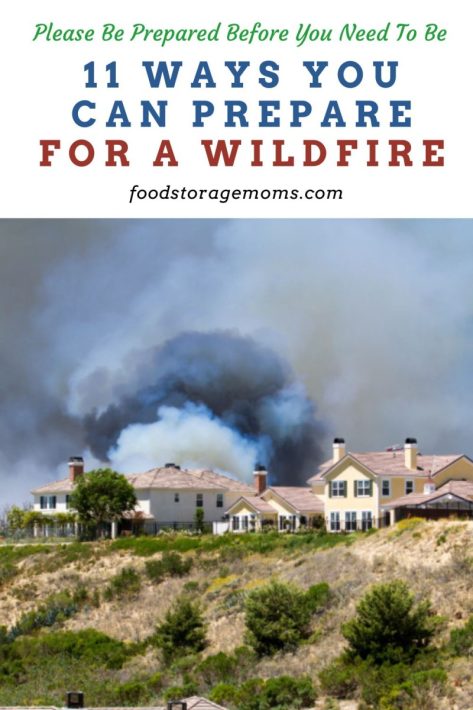
1. Know Your Zone
While you may live a reasonably safe distance away from a reported wildfire in your region, a lot can happen in a short amount of time. Sometimes when a wildfire seems to be headed in a particular direction, the winds can shift and set the fire on an entirely new course.
So, make sure that you stay updated on any changes in safety and evacuation recommendations for your area and know what your evacuation zone is. This is one of the most important tips when it comes to how can you prepare for a wildfire.
2. Practice Your Route
Don’t just assume that you will be able to evacuate on the main highway to get away from the threat of a wildfire if the situation escalates to that. The main route that you’ve planned on taking could be blocked off by fire, debris, or traffic. That’s why it’s crucial for you to have more than one route planned out and that you practice it with your family before it becomes mandatory.
One of the challenges faced by those living in Paradise, CA back in 2018 when they have that devastating fire, was the main evacuation roads were few and became clogged with fire, smoke, vehicle traffic, and rescue squads. Hundreds of families ended up in the middle of town using large store parking lots to hunker down since they couldn’t truly evacuate. Know where the safest location might prove to be, plan your route to get there, and have more than one option, just in case.
Perform some evacuation practice sessions so all family members know where to go and the safest way to get there. That includes your young school children.
3. Have an Emergency Kit Ready to Go
Don’t wait until the last minute to gather up emergency supplies that you’ll need to bring with you if you’re forced to evacuate. Keep an emergency kit in your car and another at home that includes essentials like water, non-perishable food, flashlights, batteries, first aid supplies, important documents, coats and blankets, and extra cash.
You should also have a good quality radio on hand so you can keep up to speed on fire advancements, possible evacuations, the estimated fire spread timelines, etc. I like having a “crank weather radio” so I can use it even if the batteries have gone dead.
4. Leave Immediately if Evacuation Orders Have Been Given
For whatever reason, there are always a few people who refuse to evacuate even after the directive has been given. Don’t be one of those “know-it-all” people who feel they can survive almost anything because you could be putting yourself and your family in grave danger.
There’s also nothing in your home that’s more valuable than your life. Wildfires can be unforgiving and you may not get a second chance to evacuate. You’re also putting other people’s lives in danger when they have to come and try to rescue you.
5. Prepare Your Home
When it comes to wildfires, there are several steps that you can take to prepare your home beforehand:
- Start off by closing off your windows and vents. This can help prevent embers and smoke from entering and sparking or causing fire damage to your home. It has been shown that if you close all the doors in the home it helps to slow down the spread of a possible fire to other areas of your home.
- Prune any trees and branches that are close to your home. Some HOAs dictate how close any bushes and trees can be to your home. Even without those guidelines, it makes common sense to cut back all brush close to your home. Some fire experts will tell you that 100 feet of clearance are prudent, but that’s a whole lot of territory to clean up. The challenge is that wind will often carry ashes long distances. Think twice before you build or renovate your home with shake shingles or roofing. Metal roofs and siding are much more fire-protective.
- Remove any vines that may be attached to your home. Going along with the item above, anything flammable attached to your home should be removed.
- Turn off natural gas lines in your home. If the fire is imminent, turn off your utilities, including power, gas, and anything else that could prove dangerous.
- Keep propane tanks away from your home. Any fuel sources, including butane, propane, BBQs, wood piles, etc. should always be a safe distance from your home. If you keep wood stored for your fireplace, consider doing so in a metal storage container.
- Have plenty of fire extinguishers on-hand. Learn the different kinds and how to use them. Have them checked and tested at least once a year.
- Fill large containers with water and place them around your home, whether it’s trash cans, pools, or buckets of water. This can possibly slow down the fire. Have some reliable hoses available to attach to any outside water spigots so you can hose down your home before being told to evacuate.
- Consider having any tall ladders you own leaning against your house so they are available to first responders to possibly use.
- If your home is a two-story, consider having those roll-up chain “ladders” in each of the upstairs bedrooms so you have multiple options to evacuate the home if the interior stairs are too dangerous to use. Practice using these safety tools so all the family members know how to use them.
- Matt, one of my readers, suggested you consider covering your exterior air vents and soffit vents prior to the fire approaching your home. This could prevent the air circulation systems in the home from drawing hot ashes and embers into your home.
6. Make Sure Your Home has Fire Insurance
Despite all of your preparations, there’s always a chance that your home could fall victim to a wildfire. That’s why it’s essential to have fire insurance in place as well as take steps to protect your home from catching on fire (such as clearing up any debris or overgrown vegetation around your property, as discussed above). Failing to do so can cause not only your home but all of your valuables from becoming a total loss, which is the last thing you need to be worrying about following a wildfire.
Take a day and go throughout your home taking pictures of all the personal items in each room. From those pictures, and your own knowledge of what may be stored on shelves and in drawers, make a written list of what is there. This information will prove invaluable if and when your home is destroyed and you need to make a claim to your insurance carrier.
Check with your insurance agent, but most homeowner policies do cover damage from fires. There may be some restrictions if you live in the mountains where trees are in close proximity to your property. Take the time to call today.
7. Create a Defensible Space
The more space you have between your home and any nearby brush or dry vegetation, the better chance you have at protecting your property from catching fire. Keep your lawn watered and maintained, clear out any dead plants, leaves, or branches from around your property, and avoid stacking firewood too close to the house.
I know many may use these things as compost for our gardens each year, but they could prove to be a true hazard. Be prudent and lay out a plan that works best for you and your family.
8. Be Mindful of Fire Hazards
During wildfire season (or really anytime), it’s important to be mindful of potential fire hazards in and around your home. Don’t leave burning candles unattended, properly extinguish all outdoor fires, and avoid activities like mowing the lawn or using power tools on windy days, keep all flammables away from furnaces and water heaters, and keep closets and other storage areas clean and organized.
9. Protect Your Loved Ones From Smoke
Even if a wildfire isn’t an immediate threat to your family, the smoke that’s lingering in the air can still be a hazard, particularly for the old and young members of your family, and those with respiratory issues like asthma. Make sure that you get everyone in your family an N95 mask to protect them from breathing in too much smoke. However, these types of facemasks were not made for smaller children, so you’ll need to cover their faces with a damp cloth. If you have elderly family members living with you, obtaining a respirator for them would also be a smart move on your part.
10. Consider Your Pets
Making a plan for your pets ahead of time can take a lot of stress off of you when you need to evacuate. You don’t want to be caught trying to retrieve them when they’ve become scared and have gone off hiding somewhere. Think about having a travel carrier, plenty of pet food, and their own emergency kits ready to go. For those of you with larger animals like goats, cows, and horses, you need to consider moving them to a safe location much sooner.
11. Don’t Return Home Until It’s Safe to Do So
Just because the threat appears to be over, doesn’t mean that it’s time to move back into your home. There may still be hidden dangers that you aren’t aware of. Be sure to wait until the authorities have given you the okay to return to your home and don’t make that decision alone.
One key component is your culinary water supply. The fire might have contaminated water resources, so check with local authorities before using your tap water upon returning to your home.
Final Word
How can you prepare for a wildfire? We’ve actually just scratched the surface in this post. Get acquainted with the various resources available to you for additional information. State or county extension services, your local fire department, the Bureau of Land Management, the American Red Cross, and others have some very valuable printouts and checklists you can use.
Some terms you might want to get acquainted with so you understand the jargon when fire reports come across the wires to your home:
- Containment
- Crown Fire
- First Intensity
- Fire Weather
- Fire Weather Watch
- Ground Fire
- Red Flag Warning
- Spot Fire
- Surface Fire
- Test Fire
There are other resources that can be referred to where fire mapping is displayed so you can track what’s going on around your area and on a much broader scope:
- The Fire Information for Resource Management System
- NASA Earth Observations
- The National Oceanic and Atmospheric Administration (NOAA)
- Air Now (just add your zipcode)
Wildfires can be terrifying events, but with the right preparation and planning, you can help minimize, not only most of the stress but also some of the risk for yourself and your family. If your area is currently dealing with wildfires, be sure that you stay informed and do everything in your power to keep everyone safe. May God Bless this world, Linda
Copyright images: House Roof on Fire AdobeStock_129913785 by moldboard, Brush Fires In Residential Area AdobeStock_104118484 by Malisa Nicolau

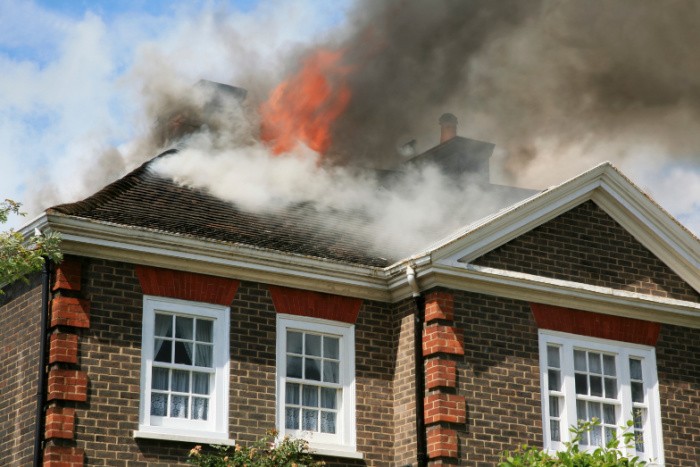

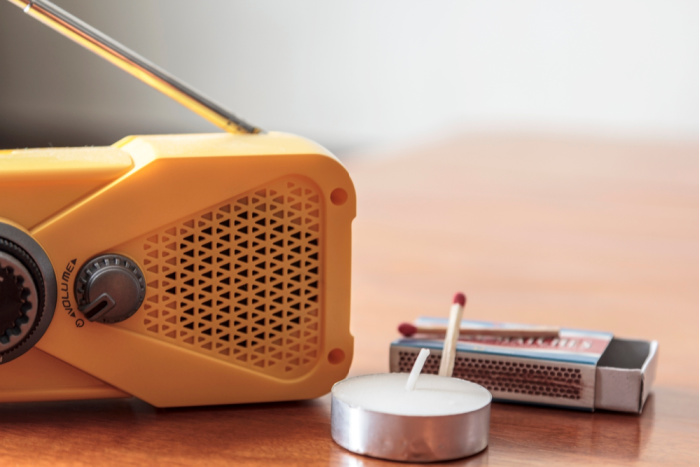
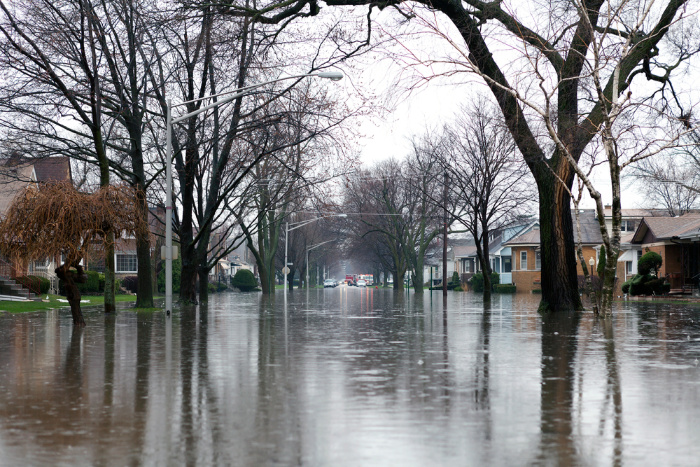



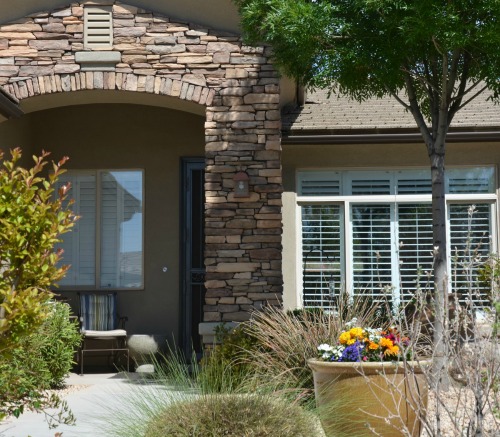












Many of the homes burn not from direct fire but from ashes that are pulled into ventilation such as roof vents or soffit vents. The insulation then catches fire. Take from that what you will but temporarily buttoning those up could help. Shut the AC off as it approaches. Don’t pull air into the structure.
I was able to save mine once by putting up sprinklers on the roof and battling the grass fire as it approached. I had scalped the lawn so there was little to burn. I’d soaked my woodpile. I had pre staged hoses as things were extreme and sure enough we got hit.
CLEAR YOUR BRUSH
I’m looking at you Kalifornia. I don’t care about how hard it is because of loose soil and hills. Kolorado I don’t care about how beautiful those trees were before the beetles got them. Plains Urbanites I’m not interested in hearing about your yard grasslands and wildflowers in August.
Clear it Cut it Remove it.
Hi Matt, you are so right about clearing brush around your home. Wow, most people would not have planned ahead like you. There was a fire in the hills above our home in Farmington, Utah. Luckily, I knew to turn off the AC. Others did not. The smoke was bad, as you well know when the fire got close to your home. Putting some sprinklers on your roof was a brilliant idea. We didn’t have firewood at that house. You really do need to have a plan such as yours. You saved your house literally. Great comment, Linda
As usual, Matt is dead on target. My dad’s home burned down during the Hayman Fire in Colorado, mostly because he and my stepmom liked having trees near the home. They had inadequate fire insurance but, because I was a home builder, we were able to rebuild. His new 3,600SF place used Insulated Concrete Forms with stucco on the exterior and fire resistant sheet rock on the interior. The new roof was metal. The end result was a close to fireproof home with 13″ thick walls–8″ of concrete and rebar plus 5″ of styrofoam insulation. I installed radiant slab heating on both floors of his two story home. They lived at 8,600 feet in the Colorado Rockies and his propane heating bill averaged $12/mo during the winter–and he figured that was mostly for their hot water heater.
Of course the fire had taken care of clearing flammables from around his house. We just had to knock down and remove the dead trees.
Hi Ray, oh my gosh, that house you rebuilt would be a dream for me! I saw a house in Cedar City, Utah that went into foreclosure back in 2008. The house was built with Concrete Forms. The house did not need air conditioning and the heating bills were so low, anyone would afford them. I wanted to buy the house but Mark wanted to be closer to golf courses and his golfing buddies. So we stayed in St.George, Utah. You could tell the family that built the house were preppers. They had shelving everywhere.
What a blessing that you were a home builder. We had some friends that apparently never looked at their home insurance policy. Yep, they had a fire and the insurance plan was probably 20 years old and never updated the cost of replacing the home. I think they are still in litigation, I think it’s been 6 years now. They just build a home after removing the debris. Great comment, Ray! Linda
So we hit worst case conditions yesterday. Dry dead everything after a drought and the wind ramped to to steady 38mph with 60mph gusts. Numerous folks lost everything. They shut the turnpike running from OKC to Tulsa down and turned traffic around on it and rerouted through small towns. It’s another reason not to run yourself too low on fuel even when traveling. The weathermen, fire crews and law enforcement were literally begging folks to bug out of their homes in places. Livestock was kicked loose and fences cut. We have roundups later.
Hi Matt, thank you for sharing what happened in Oklahoma! I watched the news and kept checking the weather channel. I’m sorry to hear so many families lost everything. Wind and fires after a drought are such a bad situation. I sure hope the people listened to those trying to control the situation by getting families to bug out or evacuate. This is exactly why we must keep our gas tanks full. Thank you for sharing, glad you and your family make it through this one. Linda